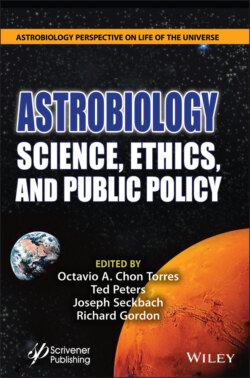Читать книгу Astrobiology - Группа авторов - Страница 39
2.3.8 Should We Earthlings Terraform Mars?
ОглавлениеShould we earthlings terraform Mars? Or, any other planet or moon, for that matter? Let’s ask two theologians, one Buddhist and one Christian, and then ask a NASA astrobiologist.
Francisca Cho, Associate Professor of Buddhist Studies at Georgetown University, raises the quandary: Should earthlings terraform Mars? “A Buddhist would apply neither an intrinsic nor instrumental value of life or nature to the question of terraforming Mars. The idea of an intrinsic value would go against the principle of emptiness. Instrumental value, on the other hand, would be problematic because one could not ensure that the instrumental objectives and the proper motivations…. There is no intrinsic worth to nature but neither is there intrinsic worth to human beings…. There is no option between them, so you have to transcend that framework all together” [2.12]. From a Buddhist perspective, neither an appeal to the intrinsic value of life nor an appeal to life’s utilitarian value to human beings provides ethical guidance for the terraforming question.
Now, let’s ask Christian theologian Cynthia Crysdale. “We need to think of ourselves as living within an ethic of risk, not an ethic of control. I say this in direct reference to the actions we take in terraforming or colonizing or exploring other planets. My caution is to point out that the conditions of possibility that we establish in the hopes of one outcome may at the same time establish conditions under which totally unforeseen schemes of recurrence become established” [2.21]. Dr. Crysdale has wisely invoked the Precautionary Principle based upon her observations about human nature—that is, human sinfulness. No ethical justification could suffice without acknowledgement of who we are as humans, including our human proclivity to mess things up. Nevertheless, anticipating the unforeseen damage we humans are capable of is a principle one must incorporate into any such project, not merely going to Mars.
NASA’s Christopher McKay provides ethical justification for his plan to terraform the red planet [2.48]. McKay hypothesizes that Mars is lifeless. At least it is lifeless today. The red planet may have been home to life in the past; but Mars must have lost its atmosphere and its ability to sustain life for reasons yet unknown. Its thin atmosphere is replete with carbon dioxide, but not oxygen. Let us speculate: Suppose we would transplant living organisms from Earth that take in carbon dioxide and expel oxygen into the atmosphere? Then, when enough oxygen suffuses the atmosphere, we could introduce oxygen inhaling organisms that expel greenhouse gases. These greenhouse gases would warm up Mars, and life would thrive. A self-regenerating ecosystem could run on its own. In less than a century, estimates McKay, we could establish a biosphere that would last ten to a hundred million years.
McKay calls this terraforming project “planetary ecosynthesis.” Is such an ambitious plan ethically justifiable? Yes. McKay starts with a simple axiom: life is better than non-life. If life is better than non-life, says McKay, then it would be our moral responsibility to sponsor ecosynthesis on that planet. Transferring terrestrial life forms to Mars would be better than leaving Mars lifeless.
Curiously, McKay appeals to both intrinsic value and instrumental or utilitarian value when justifying planetary ecosynthesis. First, the intrinsic argument. Because life has intrinsic value, Mars with life would be ethically of greater worth than a lifeless Mars, even if it is transplanted life. Second, the instrumental argument. Because we on Earth would learn so much from the Mars project about sustaining a biosphere, we could apply what we learn on Mars to sustaining Earth’s biosphere in the face of our imminent ecological challenges. “Both utilitarian and intrinsic worth arguments support the notion of planetary ecosynthesis” [2.46].
Should we terraform Mars or any other celestial body within our solar neighborhood? On the one hand, McKay’s argument that life is better than non-life provides a sound point of departure. On the other hand, transplanting terrestrial life to an extraterrestrial location looks a great deal like colonizing. As we bring the history of terrestrial colonization to mind, we cannot avoid recalling the imperialism and greed that motivated colonization and the devastating impact of exploitation and genocide on the lands colonized. The Crysdale incorporation of risk based upon what we know from history about human nature gives one pause.
Our pause cannot last too long. The Mars Society is already making plans to colonize the red planet.
